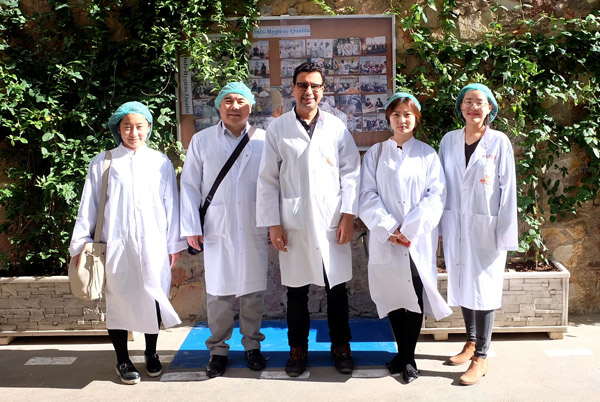Interns bolster China's global voice
 |
|
Fang Xidong (far right) visits a candy factory in Casablanca, Morocco, with Chinese importers.[Photo provided to China Daily] |
Assigned to the independent evaluation unit of the center, Fang's job largely involved evaluating projects conducted by the organization and summarizing their achievements.
"Like most interns, reading a wide variety of reports was part of the job," said the 24-year-old graduate student in international business at Shanghai University of Finance and Economics.
"The job presented a more colorful world to me. I used to only follow the news coming out of countries such as the United States, the United Kingdom and Australia."
Through the internship, Fang, who also holds a degree in finance from Queen Mary University of London in the UK, learned about the export of Colombian cocoa beans, the manufacturing of Moroccan canned seafood and the types of economic assistance provided for women in developing countries.
"Everyone at the ITC is devoted to making the world a better place, and I'm grateful for the opportunity to have worked there and learn more about the world," she said.
Fang is among the 100 students on a SUFE program, launched in 2015, that provides participants with the chance to study at one of five overseas universities affiliated with SUFE, such as the University of North Carolina at Charlotte and George Washington University, as well as undertaking internships at international organizations or institutions related to foreign affairs.
Most of the expenses related to the program, such as tuition fees, scholarships and meals, accommodations and medical insurance, are covered by the China Scholarship Council.
"The program aims to educate financial, commercial and legal professionals who can express Chinese ideas on the global stage," said Li Jinsong, deputy dean of the Postgraduate School at Shanghai University of Finance and Economics.
"We will expand our cooperation with more universities and organizations to provide students with more internship opportunities in the future."
Fang said that while working in such a multicultural environment can be a challenge, her knowledge of international economics, politics, law and research methodology, which she picked up during her senior year at SUFE, helped her to find her feet with relative ease.
"In terms of my career, I will first find a job in a large multinational company, laying the foundation for my dream to work in international organizations where professional working experience is a must for candidates," said Fang, who is now preparing her graduation thesis in Shanghai.
Like Fang, 23-year-old graduate student Zou Nan has recently completed an internship, but at the International Finance Corporation, a member of the World Bank Group in the United States.
In her role, Zou was responsible for the collection of data about relevant indicators and the assessment of projects for more than 100 developing member countries of the World Bank Group.
"I was very nervous at first because I knew little about developing countries and the meaning of most of the indicators used in the reports," she said.
"But I managed to learn on the job quickly, and the knowledge gained from the program proved to be very useful."
Liang Guoyong, an official at the United Nations Conference on Trade and Development, said adaptability is a key trait for students when working in international groups.
"International organizations have a multilingual and cross-cultural working environment. Requirements vary in different organizations and positions. What interns need is excellent professional skills and the ability to adapt," Liang said.
Tough selection process
Candidates aiming to be a part of the three-year program have to meet the high standards set by SUFE.
Rong Jun, deputy director of the International Exchanges and Cooperation Department at the university, said candidates are required to take written tests in Chinese and English, seven rounds of interviews on various topics not limited to finance, law and international relations, and to deliver prepared and impromptu speeches. Their grades are also taken into consideration.
The students selected for the program also have to take extra classes to gain knowledge about international groups and learn a third language in addition to Chinese and English.
"It's truly a tough challenge for them to acquire a third language such as French, Arabic or Spanish within a year," said Cheng Qian, a professor at the university's Foreign Language Institute.
"But it is important, as they may need to communicate with other people in that language during their internships."
The first year of graduate study begins at universities overseas, during which students are provided with internship opportunities in international organizations or institutions such as the United Nations, the World Bank and the Inter-American Development Bank.
The second year involves writing a dissertation back in China. Students may also apply for internships at the Chinese branches of international organizations and institutions, such as the New Development Bank and the Asian Infrastructure Investment Bank.
Students who successfully graduate from both domestic and foreign universities are awarded a double Master's degree.
The program has been well-received by universities and organizations. "The students have always put forward good ideas," said Chan Soon Huat, director of the Master of Science in Applied Finance Programme at Singapore Management University. "I have been surprised at how professional Chinese students are during their time here."
Xu Jianjun, an official at the international promotion and cooperation department of the Inter-American Development Bank, said Chinese interns are well-equipped with strong business, learning and communication skills, and adapt easily to the international environment.
"As our first cooperative project with universities in China, the program plays a vital role in demonstrating how Chinese talent can be cultivated for international organizations," Xu said.
A national initiative
Since the project to nurture talent suited to international organizations was launched, a steady stream of Chinese have worked for international bodies such as the Office of the United Nations High Commissioner for Refugees and the International Telecommunication Union.
According to the Ministry of Education, Chinese students started interning at the United Nations Educational Scientific and Cultural Organization in 2015. Among that first group of interns, four were employed by UNESCO and the International Court of Justice.
Like SUFE, Beijing Foreign Studies University has been grooming talent with excellent foreign language and intercultural communication skills since 2015.
The university has established the Institute of International Organizations, the Silk Road Research Institute and the International Organizations Research Center to help students better understand other countries.
Meanwhile, Renmin University of China has set up an information network that offers basic knowledge of international groups. It also regularly organizes a series of seminars to encourage further learning in the field.
The Graduate Institute of Translation and Interpretation at Shanghai International Studies University has been a key player in training translators and interpreters for international organizations. Students at the university can major in one of the six official languages used by the UN.
Other institutes of higher learning, such as Tsinghua and Fudan universities, are teaching students management skills in a global environment. As of the end of 2014, only 1.09 percent of staff members at the UN Secretariat were Chinese, according to official data, while 6.03 percent came from the United States.
"This national strategy to cultivate talent for international organizations should be given priority by more universities," said Pu Ping, professor at the Institute of International Relations at Renmin University of China, speaking last year at a forum on the cultivation of talent for international organizations. "Good curriculum design for third languages, international relations and law is essential to achieving this goal. More opportunities, be it internships at international groups or volunteering at global conferences, should also be provided."


















